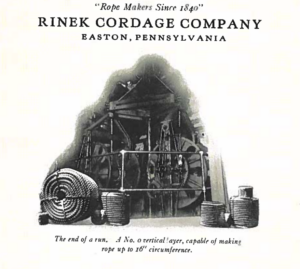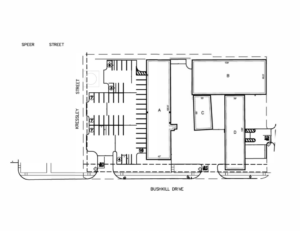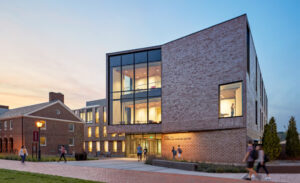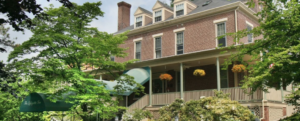The former Rinek Rope industrial site has been purchased by Lafayette College. Our team has formed a proposal on how we think the site can best be utilized. Understanding the social context surrounding Rinek Rope explains how and why our team formed the specifics of our proposal. This section will detail the history of Rinek Rope and why it is important to preserve the history, as well as the clients affected by our proposal and how their needs will be met.
Jacob Rinek was one of the most prominent businessmen in Easton, Pennsylvania. According to records, he came to Easton around 1830 while he was in his early twenties. He had an expert knowledge of both the rope-making trade and business. Rinek Cordage Company was founded in 1840 and the company became one of the most important names in the industry. Jacob Rinek was also instrumental in the manufacture of iron. Due to his prominence, he was heavily influential in building up the west end of Easton. He was connected with many companies focused on municipal improvement, such as the Olive Park Association & Improvement Company. He was also responsible for raising money to purchase land for a county courthouse and jail.
The trend of influencing the city continued throughout generations of the Rinek family. For a time, Rinek Cordage Company was called Rinek & Sons because of the involvement of Jacob’s sons, Howard and John. Howard Rinek became president of Rinek Cordage Company in the late 1800s. Howard followed in his father’s footsteps by becoming one of the most guiding influencers in Easton. In fact, Howard was responsible for organizing the Edison Illuminating Company after incandescent electric lights were installed in his home on College Hill, the first to be installed in an Easton residential building. The company installed electricity and trolleys in the city. After his electric company was sold to E. B. Smith & Company, Howard Rinek returned to cordage manufacturing.
Rinek Cordage Company valued quality. They hired master craftsmen to check and test rope before shipping them so customers could expect safe and consistent results. The company supplied ropes for rigging ships, railroads, and many departments of the United States government. Their reach was far beyond Easton, or even the country. They also produced large ropes for ships that aided in building the Panama Canal.
The site also has history in the aviation industry. Norvin Rinek, Howard’s son, organized the Rinek Aero Company. He designed and built the first eight-cylinder water-cooled engine in the country, built out of aluminum alloy. The engine was used in an airplane he built just three years after the Wright Brothers flew the first aircraft.
Lafayette and Easton have expressed interest in saving this rich history by restoring the building, instead of demolishing it. Salvatore Panto, the Mayor of Easton, expressed in an article from The Lafayette, “I think it’s important that this piece of history is saved, and glad the college is determined to save this one. Usually, the college is very diligent in trying to save buildings”.


The two clients that are affected by this proposal are Lafayette College and the City of Easton. With the current plans, the Rinek Rope complex would be used for storage, Easton Emergency Squad, and a maker space for civil engineers. So, even though the space is in Easton, it would strictly be used for Lafayette purposes. The current proposals ignore the equally important client of the Easton community.
A 2017 Tech Clinic report titled ‘Re-envisioning a Future for the Bushkill Corridor’ details the current needs of both entities. This report also showcases how the strive for development in the Bushkill area has been worked on for years. Lafayette College is looking to expand beyond College Hill. They also lack a connection between Lafayette and the surrounding community of Easton, especially from Bushkill drive and beyond. Easton is in need of a shared community space. The report explains that there are not many outdoor attractions for residents to use as leisure space. Easton also feels the disconnect between their community and Lafayette. The lack of development keeps the area unsafe and underutilized. The disconnect and underdevelopment disincentives both Lafayette and Easton residents from using the Bushkill area.
Lafayette wants development along Bushkill Drive, including the Rinek Rope factory, to coincide with their future expansion. Easton wants the area to be used effectively and functionally, and for the area to benefit the greater Easton community. Although a maker space for engineers and a storage space for facility operations would meet the current expressed needs of Lafayette, our team proposes a plan that takes into consideration the problems of both clients to satisfy broader needs.
In recent years, trends of development have started around the Bushkill area, and our proposal is involved in continuing them. The Karl Stirner Arts Trail runs along the Bushkill Creek, an art experience that connects the urban environment to nature and creativity. The Arts Trail also connects with the newly built Easton Silk Mill, a former silk mill adaptively reused for commercial and residential space. We believe that the Rinek Rope complex could be a part of this revitalization of Easton north of the Bushkill Creek, instead of just being a storage closet or maker space for Lafayette College. That is why our proposal is for the Rinek Rope complex to be converted into a hotel, café, and venue space.
To recap:

Building A would be the hotel, called ‘The Rinek’.
Building B would be the venue space.
Building C would be the café, called ‘Cordage Café’.
Building D would remain as a place for Lafayette to follow their original plan. It would be used for storage and an ambulance bay for Easton Emergency Services.
We chose a hotel as the main use for the former Rinek Rope Factory because it would be beneficial to both the college and the city of Easton. It would be a catalyst for future development along Bushkill Drive for both communities.
A hotel on Lafayette’s campus would allow for prospective students, alumni, and families to have a place to stay, and provide accommodation for athletic events, academic symposiums and conferences. Hotels on other college campuses provide insight into the strong financial incentive to develop hotels around colleges. According to Kerry Ranson, CDO of a Georgia-based management company called HP Hotels, university cities are “recession-proof”. College towns provide constant demand for hotels because there is always a consistent flow of traffic regardless of the overall economy.
Oberlin College is a private liberal-arts college in Oberlin, Ohio with about 2,600 undergraduate students. It is very similar in size to Lafayette College, which has a total enrollment of about 2,500 undergraduates. Oberlin College opened The Hotel at Oberlin with help from Smart Hotels, a company that specializes in college lodging. Parents were pleasantly surprised at the quality of the accommodations when visiting the school with their high school students. One parent said, “The college obviously put tremendous thought into every detail, from the booking, to the front desk, to the food in the restaurant.” A professor at Penn State University and director of the Center for Hospitality Real Estate Strategy, John O’Neill, points to the boutique hotel movement and the economy as evidence why people are willing to pay for good quality lodging when visiting college campuses. The quality of The Hotel at Oberlin is not just for people to be impressed while visiting, but to communicate one of Oberlin’s core values – sustainability. Mike Frandsen, vice president for finance and administration at Oberlin, stresses sustainability as a part of Oberlin’s story. Oberlin realizes that when people visit their campus, the hotel will be a major part of their experience. Having their values instilled within the hotel is an important way of projecting the image they want to portray to visitors. The Hotel at Oberlin is one of the only hotels in the United States to qualify for LEED platinum certification from the U.S. Green Building Council.
Sustainability is also a core value of Lafayette College, as expressed on their website. Lafayette prides itself on constructing LEED-certified buildings, investing in renewable energy, and committing to reducing carbon emissions and improving energy efficiency on campus. Rockwell Integrated Sciences Center received a LEED Platinum certification, like the Hotel at Oberlin. The only other LEED certified building on campus is Grossman House for Global Perspectives, with a Gold certification. Emphasizing sustainability through this project with adaptive reuse and striving for LEED certification will give the college more credibility. A LEED certified hotel would be a great way to tell Lafayette’s story to prospective students and other visitors.

Pictured: Rockwell Integrated Sciences Center at Lafayette College. This building is LEED Platinum certified, the highest recognition awarded by the U.S. Green Building Council.
Although there are other hotels in the Easton area, demand for a hotel close to Lafayette College exists. On Lafayette’s website, there is a web page with details about hotels in the area, as well as dining and shopping options. Some hotels listed on are the Grand Eastonian Suites Hotel (1.6 mi.), Hampton Inn Easton (6 mi.), Holiday Inn Express (3.8 mi.), and Lafayette Inn (¼ mi.).

Pictured: The Lafayette Inn, a 17 room inn 2-blocks from campus.
The Lafayette Inn prides itself on being just a 2-block walk to campus. It describes itself as “ideal for families visiting the College as well as the Easton Historic District.” While this is true, the inn only has 17 rooms. Under the link to the website for Lafayette Inn, this blurb is written:
“Family Weekend and Graduation at The Lafayette Inn:
Due to the high demand for rooms during Family Weekend and Graduation, The Lafayette Inn uses a lottery system to reserve rooms. Parents and other family members of Lafayette Students can put their name on the list to participate in the lottery at any time and they are entered in the drawing an additional time for each night they have stayed at the inn. The Family Weekend drawing takes place the first week of May and the Graduation drawing takes place the first week of September. Winners are notified by phone or email after the drawing.”
The high demand for rooms prove that another hotel on campus would be very beneficial for families, members, and colleagues of the Lafayette community. The Rinek would be able to offer significantly more room for accommodations. Lafayette could do away with a stressful lottery system for families to have to reserve rooms to visit their children or attend their graduation.
Johnathan Capps, vice president of revenue at Charlestowne Hotels adds another market college hotels should be interested in – weddings. He sites data from Facebook analysts that found that 28% of married couples met in college. Couples could want to come back to wed where they met. With the assumption that the rest of the Bushkill area will continue development after the hotel is built, there will be a more established connection to the Arts Trail and the Bushkill Creek, and the area will be more picturesque and safer. If the hotel and venue space were revamped to be able to accommodate weddings, that could be another source of business for the hotel.
The hotel would also be a great benefit to Easton, as well. Mayors across the country believe hotels are critical parts of local economic growth, career opportunities, and community development. According to the U.S. Conference of Mayors and the American Hotel & Lodging Association, a 2017 survey shows that 9/10 mayors believe their community would benefit from additional hotels. Hotels provide a valuable source of quality jobs, support for their communities through tax revenue, capital investment, tourism development, charitable contributions, and sponsorships. Mayors surveyed expressed that tourism and hospitality are one of the largest sectors of their economies, along with healthcare. A hotel in Easton would boost existing local businesses, like the Silk Mill, and offer opportunities for more businesses to move in around the hotel. Hotels and employees are crucial to show visitors the city’s values. With our proposal striving for the Rinek to be LEED certified, the hotel would not just give sustainable credibility to Lafayette College, but Easton as well.
A great way for a building to achieve LEED certification is through adaptive reuse, which we will be utilizing in our project.
Continue reading about Adaptive Reuse here.